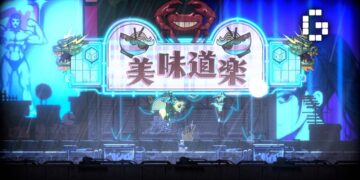Takashi Tokita is an industry veteran, with 35-36 years under his belt with Square Enix. The man had met up with GameStart’s organizers, Eliphant, back in March this year. He’s a guest for this year’s event and will be making several appearances, but he’s also done some Q&A at the pre-event press conference. We were present with other members of the media, soc heck out what he has to say!
From Square Enix itself is Final Fantasy VII Remake, Tokyo RPG Factory’s ONINAKI, and Chocobo Mystery Dungeon: Everybuddy, present at GameStart. Tokita’s current role is producer in Square Enix, while also being creative producer for Tokyo RPG Factory.

With such a long tenure in games, surely there must be a game that is most memorable to him? He considers it a hard question, and has to provide two titles. He provides his reasoning as, the very first game is naturally going to stick in his mind, while his latest title would be the freshest in his memory. Thus, he answers as such: Live A Live, on the Super FAMICOM, and ONINAKI, his newest game. Speaking of ONINAKI, he and the staff wanted to merge some concepts together; namely, the “concept of rebirth and reincarnation” and a real-time job change system, that leads to the game you see today.

He briefly touches on his lengthy experience within the game industry. He talks about the different platforms and the games released on them, and how people have interacted with the medium. Some of the biggest changes for him have been the emergence of 3D graphics, along with the internet. “It changes how people play their games and enjoy gameplay,” he says. RPGs by themselves he believes have mostly stayed the same, but being able to revisit them and put in fresh perspectives gives Tokita the drive to continue. Not fatigued of the job yet!
ONINAKI is billed as a JRPG, but what are the differences between a JRPG, and a “traditional” RPG? He thinks it’s the influence of Japan’s entertainment industry as a whole, with manga and anime alongside games. People get influenced by manga and move on to create anime content, then continue to JRPGs. In JRPGs, you’re typically put into the shoes of the main character and experience the story together, which makes them stand out.

In regards to the popularity of JRPGs, he also credits it to the influence of manga. With Tezuka Osamu, his manga – some of his works include Astroboy, Black Jack, Dororo and Metropolis – weren’t strictly “child-oriented”, and artists followed in footsteps by including more heavy topics into their works. This influence would then be included into JRPGs of similar genre. JRPGs then don’t get seen as “childish”, with gamers able to find content they relate to in the games.

Games could arguably be loosely categorized into traditional turn-based ones – Chrono Trigger and older Final Fantasy games – and more active, action oriented ones – a la Parasite Eve, ONINAKI. Tokita doesn’t have a strict preference, believing both methods provide different ways for a player to experience a game. After all, turn-based systems allow users to think and strategize more deliberately, but active systems require a faster reaction. What he enjoys is deriving new battle systems from currently existing ones, seeing what he can take out or remove to keep it interesting for a player.
Tokita has heard his share of HD or remake requests for his games, especially on anniversaries of release, or even just mentioning the title. They’re aware of the demand, so they’re trying to think of ways to work towards fulfilling that. There’s nothing he can say for now though, but he does ask for the requests to continue. Who knows, we might see it happen some day!

With ONINAKI now released, Tokita isn’t able to disclose his future projects, but there is one in the works. He’s also dreaming of another title he’d like to see realized, so there could even be two titles to look forward to. He asks to keep an eye out for the announcements.
We’ll be eagerly anticipating his next project then! Let’s keep our voices heard for the games we want, and cross our fingers for it to come within our lifetimes, eh?










![[EXCLUSIVE] Inside Japan’s Indie Game Revolution – An Interview with BitSummit Organizer Masahiko Murakami](https://cdn.gamerbraves.com/2025/05/BitSummit-Orgainzer_Interview_FI-360x180.jpg)
![[EXCLUSIVE] The Art of Adaptation: Developer Interview Details the OVERLORD Mobile RPG Lord of Nazarick](https://cdn.gamerbraves.com/2025/05/Lord-of-Nazarick_Interview_FI-360x180.jpg)
![[EXCLUSIVE] Taking Gundam in Bold New Directions – Interview with GQuuuuuuX Director Kazuya Tsurumaki](https://cdn.gamerbraves.com/2025/04/Kazuya-Tsurumaki_Interview_FI-1-360x180.jpg)


![[SEA Exclusive] From Shadows to Shipwrecks – Jennifer English Talks About Bringing Emotional Depth to Clair Obscur: Expedition 33](https://cdn.gamerbraves.com/2025/04/Clair-Obscur-Jennifer-English_Interview_FI-360x180.jpg)

![[EXCLUSIVE] Do the Game Interview – An Intimate Look at the Challenges of Game Development](https://cdn.gamerbraves.com/2025/04/Do-the-Game_Interview_FI-1-360x180.jpg)
![[EXCLUSIVE] Interview with the Minds Behind of Den of Wolves – 10 Chambers’ New Sci-Fi Heist FPS](https://cdn.gamerbraves.com/2025/04/Den-of-Wolves_Interview_FI-360x180.jpg)
![[GameStart 2019] A session with Takashi Tokita, touching on his industry experience and JRPGs](https://cdn.gamerbraves.com/2019/10/tokita-takashi-feature-750x392.jpg)








![[GUIDE] SD Gundam G Generation Eternal Unit Tier List](https://cdn.gamerbraves.com/2025/04/SD-Gundam-G-Generation-Eternal-Tier-List_Review_FI-360x180.jpg)
![[GUIDE] Clair Obscur: Expedition 33 Tier List – From Gustave to Verso: Who Deserves Your Party Slot?](https://cdn.gamerbraves.com/2025/04/Clari-Obscur-Expedition-33-Character-Tier-List_Guide_FI-360x180.jpg)